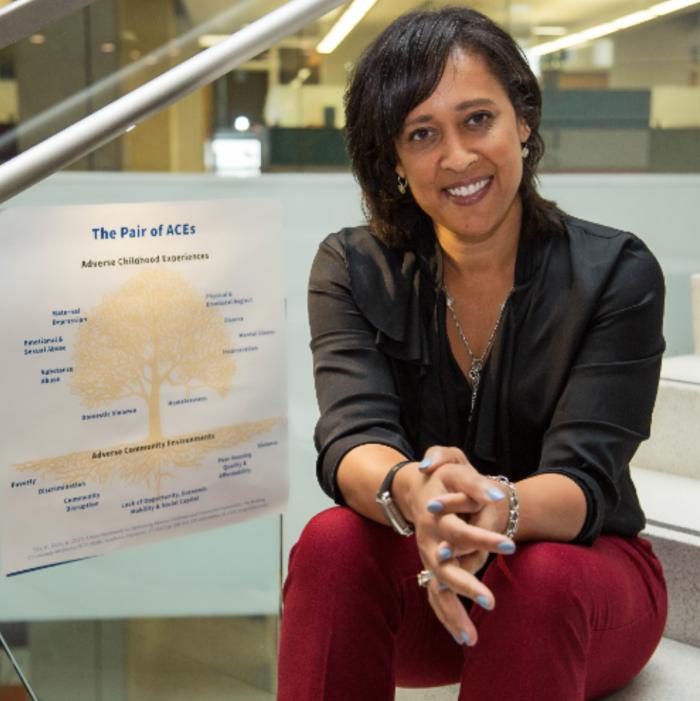Wendy Ellis

Wendy Ellis
Dr. P.H.
Assistant Professor and Center Director
Assistant Professor
School: Milken Institute School of Public Health
Dr. Wendy Ellis is an Assistant Professor in Global Health and the Director of the Center for Community Resilience at the Milken Institute School of Public Health at George Washington University. The Center for Community Resilience seeks to improve the health of communities by enabling cross-sectoral partners to align policy, program and practice to address adverse childhood experiences in the context of adverse community environments--or as Ellis has coined it "The Pair of ACEs". This innovative framing of ACEs, with an explicit focus on equity and prevention, has had a substantial influence on local initiatives, programs, public health initiatives and local, state and federal policy. Using the Pair of ACEs framing, Building Community Resilience networks have successfully led systems and policy change focused on addressing long-standing economic, social and health disparities by partnering with community, integrating service delivery and building political will for change.
Building Community Resilience (BCR) collaborative and networks are implementing the BCR process based on Ms. Ellis’ research in designing a strategic approach for multiple systems to align resources, programs and initiatives with community based partners to address adverse childhood experiences and adverse community environments. strengths based approach is aimed at building an infrastructure to promote resilience in vulnerable communities by improving access to supports and buffers that help individuals 'bounce back' and communities thrive. BCR process has been adopted by governmental agencies and coalitions in countries across the globe including Canada, Finland, Scotland, Ethiopia, Somalia and Kenya. Here in the United States the BCR collaborative consists of cross-sector coalitions in six regional metropolitan areas based out of Cincinnati, OH; Dallas, TX; Portland, OR; Washington, DC; St. Louis and Kansas City, MO. and Seattle, WA. Dr. Ellis co-authored an article detailing the BCR process, "A New Framework for Addressing Adverse Childhood and Community Experiences: The Building Community Resilience Model" which can be found in the September 2017 Journal of Academic Pediatrics. The BCR initiative is supported by the Kresge Foundation.
In 2019, Dr Ellis' dissertation titled "Community Resilience: A Dynamic Model for Public Health" which applies dynamic systems modeling to governmental public health department efforts aimed at addressing ACEs and building community resilience was implemented as the Resilience Catalyst initiative. The Community Resilience model is designed as a Public Health 3.0 strategy for the Chief Health Strategist working across sectors to drive initiatives that address inequities that are at the heart of the nation's health disparities. There are currently four local health departments (Mesa County, CO; AppHealth, NC; Cambridge, MA and Louisville, KY) using Dr. Ellis' Community Resilience framework to address racial disparities in evictions, income inequity, social cohesion and access to economic mobility as a public health prevention initiative. Five additional local health departments will be added in late 2020. Dr. Ellis' team partners with the National Association of County and Health Officials, the American Public Health Association and the Centers for Disease Control to support the Resilience Catalyst cohorts.
Dr. Ellis has spent the last decade developing and working to grow a 'resilience movement' to address systemic inequities that contribute to social and health disparities that are often transmitted in families and communities from generation to generation. The COVID-19 pandemic has put on full display inequities that can be measured along the nation's most fragile fault lines-- race and poverty. Under Dr. Ellis' direction, the groundbreaking work of the Center for Community Resilience has been pivotal in influencing public health and child health advocates placing equity at the center of addressing trauma and building community resilience. In early 2020, Dr. Ellis co-authored the Center's Fostering Equity modules based on the work of BCR community experience in galvanizing cross-sector collaboration with equity as a driving principle. The COVID-19 pandemic response comes at a critical inflection point for Dr. Ellis' work and affirms two Center for Community Resilience goals:
- Implement Public Health 3.0 as an Integration and Equity Strategy
- Foster Adoption of Equitable Policy and Systems Change
The Center for Community Resilience achieves these goals through three lines of work-- The BCR Collaborative, the Resilience Catalysts and The Policy Lab.
The Policy Lab@CCR is a joint effort with the Sumner M. Redstone Global Center for Health and Wellness at The Milken Institute School for Public Health. The Policy Lab works to develop innovative policy solutions to address the Pair of ACEs and advance equity. The Policy Lab is able to do this by incubating new policy ideas derived from community wisdom and programmatic and practice experience and building network capacity to be effective advocates. The Policy Lab's work is supported in part by The David and Lucille Packard and Kresge Foundations.
In 2018 Dr. Ellis was selected as an Aspen Institute Ascend Fellow. According to the Aspen Institute "Ascend Fellows are visionary, entrepreneurial leaders with bold ideas that can move the needle on health and wellbeing and offer concrete economic and social mobility pathways for children and their families. The Fellowship provides leaders the space and support to bring their ideas to life and scale." In 2017, Ms. Ellis was selected as for the Doris Duke Fellowship for the Promotion of Child Well-Being— which seeks to support emerging scholars focused on innovations to prevent child abuse and neglect. The fellowships are designed to develop a new generation of leaders capable of creating practice and policy initiatives that will enhance child development and improve the nation's ability to prevent all forms of child maltreatment. She was also an inaugural Milken Scholar at the Milken Institute School of Public Health at George Washington University where she earned a DrPH in Health Policy in 2019. Ms. Ellis holds an MPH from the University of Washington’s School of Public Health and a BS from Seattle University. At the University of Washington she led a study investigating factors associated with disparities in access to mental health care among children in Washington State which was published in Health Affairs.
Ellis' mission is informed from her previous career as a television journalist covering stories highlighting the failures of multiple systems-- from juvenile justice to child services to health care--leave vulnerable the very children and families they were meant to serve. As a result of this experience and years of independent research, she developed the 'BCR process" by which communities and the systems that touch children and families-- from housing, public education to pediatric health to juvenile justice-- collaborate and align to provide the buffers that enable children and families to thrive. Dr. Ellis' work is also informed from her personal journey of 'bouncing back' from adverse childhood experiences which includes an ACEs 'score' of eight. She has lectured and written about the role of buffers (social and personal relationships) and supports (quality education and community safety) as important pillars in building her own personal resilience. It is this journey that informs her insight into the science of community resilience.
Ellis has consulted on the Rockefeller 100 Resilient Cities initiative in Dallas and Washington, DC, organized and moderated Congressional briefings, and is widely quoted on topics related to childhood trauma and community resilience in national media outlets.

